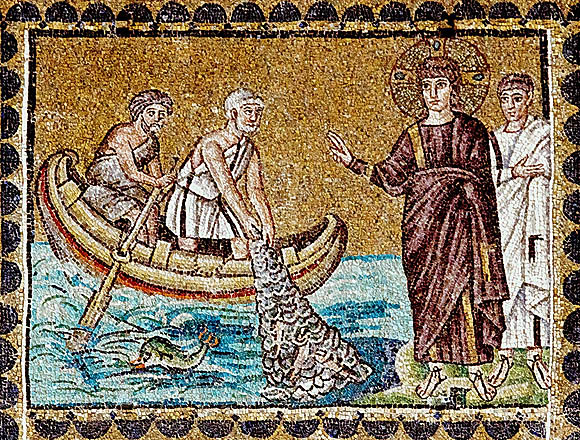Jesus’ final parable at the end of his first discourse in Matthew from the boat takes advantage of the setting, for it’s all about fishing. Fish and boats become a common theme of his ministry, figuring in so many stories that the fish was adopted later on as a secret symbol of the faith. It all starts here.
It may all be a natural coincidence, as he was hanging out in a fishing village with a bunch of fishermen, after all, and even borrowing one of their vessels as a stage. But Christianity “coincidentally” became the dominant Western religion of the Piscean Age; and so there is a possibility that the whole fisherman thing was a metaphor from the very start. Jesus gets quite involved in their trade and travels with them on the lake, and later he gets Peter to catch a fish with a coin in its mouth to pay their taxes, which is a little bit odd.
Even odder is that the last time he meets up with Peter and the boys in John, they are not only fishing, but the Gospel records the exact number of “great fish” landed after Jesus tells them where to cast the net —153. This is quite an odd number (no pun intended); 153 can be represented graphically as a triangle, and among its many mathematical peculiarities (many completely beyond me), 153 is the sum of the all the numbers from one to seventeen.
This was enough to make the Early Fathers look at John’s text quite closely. Through numerology, Augustine thought that 153 represented totality — that is, all the fish. Jerome agreed for a different reason; and no less than 18 different ways (most using gematria, where the numerical values of words in Hebrew or Greek are compared) — have been found or invented to cover it.
However derived, the point here is that all the fish represent all the people in the world (or at least the saints). This provides not only the key to the Parable of the Net, but most of sea and ship symbolism throughout the Bible. The story may have mystical meanings, too, as it is one of the few parables that made it (albeit, like the others, in a very different form) into the mysterious Gospel of Thomas.
Here then, is the text. As before, words in [] brackets in the original are those replaced by the Spiritual Code by TSM in the interpretation.
“Again, the [Kingdom of Heaven] is like a [dragnet] that was cast into the [sea] and gathered some [fish] of every kind, which, when it was filled, [fishermen] drew up on the [beach]. They sat down and gathered the [good] into [containers], but the [bad] they [threw away]. So will it be in the end of the world. The angels will come and separate the wicked from among the righteous, and will cast them into the furnace of fire. There will be weeping and gnashing of teeth.” (Matt. 13:42-47)
As he had in the Parable of the Weeds a short time before, note that Jesus basically explains the meaning (shown below in bold) openly. The main difference is that the latter uses the metaphor of a field of agriculture for the world, while this employs the sea.
“Again, the [rule of God] is in [the Church] that was cast into the [restless world of humanity] and gathered some [people] of every kind, which, when it was filled, [angels of judgment] drew up into the [afterlife]. They sat down and gathered the [righteous] into [heaven], but the [wicked] they threw [into hell]. So will it be in the end of the world. The angels will come and separate the wicked from among the righteous, and will cast them into the furnace of fire. There will be weeping and gnashing of teeth.”
Then, as any good teacher should, Jesus ends the lesson by asking his students if they got it, and why they should:
Jesus said to them, “Have you understood all these things?”
They answered him, “Yes, Lord.”
He said to them, “Therefore every scribe who has been made a disciple in the Kingdom of Heaven is like a man who is a householder, who brings out of his treasure new and old things.” (Matt. 13:50-52)
And with that, he adds just a little bit more symbolism as a reward to encourage them if they really did understand. Look how it can be symbolically treated by TSM:
He said to them, “Therefore every [one instructed in the letter of the Law] who has been made a [student of the mysteries] in the [realm of the Spirit] is like an [intellect] who is a [a scholar], who brings out of his [store of wisdom] new and old things.”
And that is a little encouragement that all who seek the divine Mysteries can take to heart.

